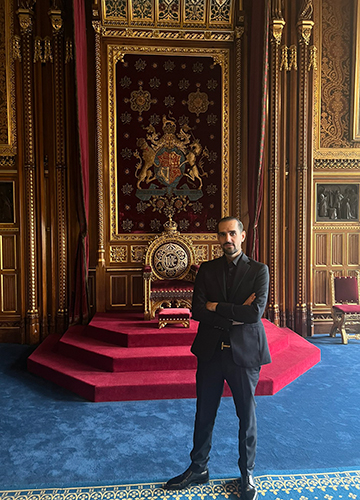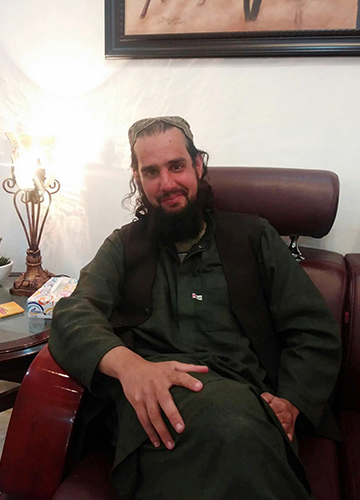Shahbaz Taseer’s nightmare began in broad daylight. On August 26, 2011, six months after his father (Salman Taseer, the governor of Punjab, Pakistan) was shot dead for opposing the blasphemy law, Shahbaz was kidnapped by terrorists while he was driving to his office.
Shabby, as he was popularly called, suddenly went from being one of the most privileged and protected people in Pakistan to a man in a soiled salwar kameez living in a tiny room with a bucket for excrement. This was his life for the five years he was in captivity―sordid, dark and foul-smelling.
And then he escaped.
“I can explain all forms of torture to you,” says Taseer, who now leads a normal life in Lahore. “It is difficult, but I can explain it with incidents, like when they got my back open.”
He talks about torture casually. And his book Lost to the World: A Memoir of Faith, Family and Five Years in Terrorist Captivity has details of it that are almost cinematic. “I am sure everybody’s slipped and cut themselves with glass. You can understand that. Being buried alive is a bit difficult to explain,” he says, laughing.
His kidnapper―Mohammad Ali of the dreaded Islamic Movement of Uzbekistan―did everything to break him, yet kept him alive. An empty gun was put to Taseer’s head and the trigger pulled twice. Nails were ripped out, and mouth sewed shut. He was buried alive, stung by bees, and flesh was cut from his back. Salt was rubbed on to his wounds.
More than the physical pain of torture, though, it was loneliness that became unbearable for Taseer. “I wouldn’t wish it on my worst enemy,” he says.
In Lost to the World, Taseer writes evocatively about how he kept his sanity by drawing lines on the mud wall to keep count of the days. The book has moments that leave you shaken and heartbroken. Taseer seeing a pomegranate tree for the first time in years. The time he heard voices of children. A sliver of soap, with a picture of a woman on the pack. Striking a friendship with a spider in the room. Taseer named it Peter, and sang to it the Spider-Man theme. “Peter was my first friend,” he says.
The book is stranger than fiction. Taseer lived with his kidnappers, survived a drone attack, fled from Pakistan to Afghanistan, and found himself in a Taliban jail from where he negotiated his freedom. Taseer tells his story clearly and passionately, with no trace of bitterness.
His memoir is about the value of love, and he finds kindness even in those who caused him pain. Aya Jahan, mother-in-law of Mohammad Ali, once stopped a torture session―she stepped into the room and said she would not let it happen under her roof. “She would have blown me up at a checkpost,” says Taseer. “She had no love, no sympathy for anyone in the world. Her personal belief structure was that of a suicide bomber. She was an extremist on a waiting list. She understood that I needed to be kidnapped. [But] for her to break these barriers, to actually come through…. Whatever be her reason for this act of kindness, it was an act of kindness. It saved my life.”
In Lahore, he has rebuilt his life―he has two children and is expecting a third.
He has plenty to live for now, but even when there was not, he discovered that he could not take his life. “I was in solitary, I was being tortured, and I wanted to take my life,” he says. “And I couldn’t. I felt like a coward. I thought I am willing to live in this degraded state, in this state of constant humiliation, and just be dehumanised.”
And then he found solace in faith. “I read a line in the Quran that said, ‘To give up hope is to give up on God and be an infidel,” he says. “I thought, wow, here you are at the crossroads of your life, and you can’t even be hopeless. Then I understood what the line meant―that you can never give up hope.”
Lost to the World is ultimately about finding faith and realising its power. It is an ode to his larger-than-life father. It is also about his mother, who was forced to watch videos of her son being tortured and yet never lost hope and continued to negotiate with his kidnappers. “She is the hero,” says Taseer. “When I say humiliating and dehumanising, maybe if it was just between me and them (the terrorists). It is something that would have been easier for me to recover. But they filmed it, sent it to this woman, and made her watch every second of it. The fact that she is okay today, and that she is still the same woman, is [a blessing].”
The hardest part for Taseer was asking for his father’s killer, Mumtaz Qadri, to be freed. It was part of the conditions that Mohammad Ali laid to set him free. But Qadri, a commando who was assigned to guard Taseer’s father, was convicted and hanged in February 2016. “A reason that I am happy, and that I strive for better things in my life, is that [Qadri] didn’t walk to his freedom, so that I could have whatever people would think is mine. I would have been a broken man [if that had happened],” he says.
Taseer used his sense of humour as a survival tool. Once Ali asked him where the most beautiful women were from. “There was no correct answer to that,” says Taseer. So he said Brazil, but Ali said it was too far. Iran then? Ali said the women there were kaffirs. They finally agreed upon Italy. “‘I will make the Vatican my harem,’ he told me,” says Taseer.
Around that time, they were forced to flee Pakistan because the Pak military had launched a massive crackdown. They journeyed across the treacherous mountains for seven days to reach safety. After they arrived in Afghanistan, his kidnappers fell to their knees in prayer. “I looked at Muhammad Ali and said, ‘Rome is the other way,’” says Taseer. “I laughed a lot because I knew how funny it was. But I never thought I would live to tell it. But here I am.”




